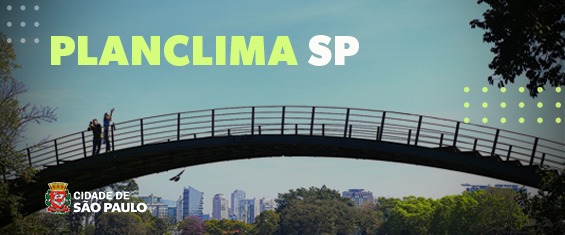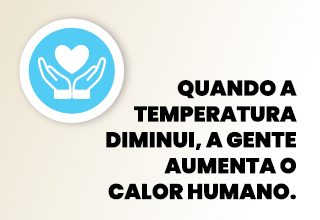Secretaria Municipal de Relações Internacionais
PlanClima SP is a guide to initiatives in the capital with 43 prioritary areas

In celebration of Environment Week, the City of São Paulo launched this Thursday (3rd) the Municipal Climate Action Plan (PlanClima SP). The document was developed as a response to climate change and guide government action to include the climate issue in decision-making processes. Also, the plan elaborates on how the population can prepare to face the impacts generated.
The commitment to the creation of the PlanClima was assumed by then-Mayor Bruno Covas, in September 2018, to align policies in partnership with the international network C40 cities. "The goal is to zero carbon dioxide emissions in São Paulo by 2050. This work was led by Mayor Bruno Covas and we are very proud to present it here today", said Mayor Ricardo Nunes. The Mayor of São Paulo notes that Covas considered all the work carried out by previous administrations when signing the commitment proposed by C40, which already provided for the preparation of PlanClima.
"Bruno was always very attentive to environmental and climate issues and Planclima is the result of the work and determination of this excellent framework that Bruno Covas set up at City Hall, which was led with great enthusiasm, passion, and responsibility, and is therefore our tribute.", said the mayor.
With the initiative, the city becomes a protagonist alongside more than 100 cities around the world and three other Brazilian cities (Curitiba, Rio de Janeiro, and Salvador), supporting the fulfillment of the Paris Agreement, so that the temperature increase leading up to 2100 does not exceed 1.5ºC.
“Cities have a fundamental role to play in achieving the goals of the Paris Agreement and decarbonizing the global economy in the coming decades. Therefore, I am very happy with São Paulo's commitment to the climate agenda. As hosts of COP26 in Glasgow in November, we want to continue collaborating with the city in launching its action plan and emission reduction targets. I believe that, as the largest city in the country, São Paulo's ambition helps us to encourage ambition in other cities around the country”, said Lisa Weedon, in a message sent to the Department of the Environment.
Plan Clima SP
The operating principle of PlanClima SP is to guarantee initiative to mitigate greenhouse gases and adapt to the impacts of climate change, so that they can be applied immediately in the city's management, including all sectors of municipal administration.
"It is a plan that comes together with a lot that is already happening, starting with the Municipal Policy on Climate Change, created to minimize emissions in the city, to contribute to the fulfillment of the agreements of the Climate Convention and Sustainable Development”, emphasized Laura Ceneviva, Executive-Secretary of the Climate Change and Eco-economy Committee of the Green and Environment Department.
The Plan's objectives are to undertake initiatives to reduce 50% of the municipality's greenhouse gas emissions by 2030, compared to 2017 levels, and implement necessary measures to reduce social, economic, and environmental vulnerabilities for an adaptation process.
The executive secretary for Climate Change, Antonio Fernando Pinheiro Pedro, was enthusiastic upon taking on the mission of working directly with Secretary Rubens Rizek (Secretary of Government) to establish the commitment of the mayor and his cabinet of secretaries to fight climate change. About the climate in the governance of the municipality he said: “We have already started with a Plan. This is very important. We already have a positive response from the fourth largest capital in the world during a historical process of research, adaptation, and mitigation measures to this asymmetrical phenomenon that is the transformation of the planet's climate.
These initiatives aim, for example, to increase the adoption of renewable energy sources to replace fossil fuels in transport and to promote active mobility and zero GGE (greenhouse gas) emissions. For the municipality to adapt, it will be necessary to increase the supply of affordable housing, create jobs in the green economy, increase the infiltration of rainwater and more green areas, contributing to the reduction of flooding and flooding.
The adhesion of people is fundamental in several proposals, such as the reduction of waste production and recycling through selective collection or composting. It is also important to highlight actions such as the implementation of more bus lanes, cycle paths, and zero-emission zones – which require the promotion of public participation and engagement for their effectiveness. To achieve several of its goals, the City Government must mobilize efforts with the State and Federal governments, as well as the private, academic, and all citizens in general.
Environment Secretary, Eduardo de Castro, thanked everyone who contributed to the Plan and recalled an excerpt of the words of then-Mayor Bruno Covas that were published in the document: “Finally, I emphasize that our commitment here is not it is limited to the present moment. It is fundamentally a commitment to future generations, to a fairer society, founded on the pillars of innovation and democratic values. Only then will we be sure of a more sustainable and resilient future”.
PlanClima SP is expected to be revised throughout the beginning of the government, together with the Target Plan and the PPA (Plurianual Plan), or when necessary. There are five guiding items for carrying out the actions:
- Towards zero carbon by 2050;
- Adapt today's city for tomorrow;
- Protect people and property;
- Atlantic Forest, we need you!;
- Generate sustainable work and wealth
Click here to access the complete PlanClima SP material (portuguese).
Initiatives in progress
Considering the city's commitment to the areas of sustainability and environmental protection, the City of São Paulo acts on several fronts related to this issue. Examples are replacing light bulbs with LEDs, replacing diesel vehicles in the public transport fleet, in addition to the implementation of Eco points, the carrying out of the selective collection, and the installation of rain gardens.
“We have a huge set of project that have been developed. A few days ago, we had the launch of a protocol to improve the relationship between the public authorities regarding issues related to environmental defense, our protection of water sources, in short, a very strong and very serious group focused on preservation”, recalled the mayor.
According to Mayor Ricardo Nunes, there are complex initiatives, but we have simple things that can be done, such as rain gardens. “Today we have 126, which add up to 28,500 m², making the city more beautiful and permeable”, he concludes.
Check out the 43 priority actions of PlanClima SP:
Towards zero carbon in 2050
1. Regulate the adoption of energy efficiency criteria in buildings by national energy conservation programs.
2. Develop studies on energy consumption patterns in the city of São Paulo, for the adoption of general energy efficiency measures.
3. Mobilize efforts to promote the production and distribution of energy from renewable sources and distributed generation, as well as improving the energy efficiency of the equipment.
4. Implement energy efficiency criteria and indicators in the acquisition of goods, contracting of services, or works by the municipal public administration.
5. Establish a standard for improving ventilation and natural lighting measures in social interest housing projects (HIS).
6. Encourage the reduction of homework distances to minimize the demand for transport services.
7. Increase the attractiveness of the municipal bus system to promote this mode of transport.
8. Encourage the use of bicycles as a common means of transport, through the expansion of infrastructure and awareness and communication strategies.
9. Promote the gradual replacement of municipal bus fleets for zero-emission vehicles.
10. Establish a Zero Emission Zone in the perimeter of the Minianel Viário.
11. Ensure that 100% of the fleet used by the City Hall (or outsourced) is zero emissions in 2040.
12. Institute legislation to encourage the distribution of fractional cargo with zero-emission vehicles within the city's perimeter.
13. Implementation of a network of logistic mini-terminals (MTL) in partnership with the private sector.
14. Improve regulations on sharing, parking, and charging of electric vehicles or zero emissions.
15. Universalize the coverage of the selective collection service for dry residues.
16. Maximize composting processes.
17. Implement eco-parks.
18. Include in the mandate of the Municipal Water Authority, in the process of structuring, the periodic reporting of operation data and monitoring of activities that generate greenhouse gases, especially about sewage, by the concessionaire of water and sewage services.
Adapt today's city for tomorrow
19. Promote the improvement of the environmental quality of the Municipality of São Paulo from the perspective of the impacts of climate change.
20. Improve the monitoring of the application, efficiency, and effectiveness of urban planning instruments used to promote the mitigation of greenhouse gas emissions and adaptation to the impacts of climate change, as well as the adoption of renewable energy sources and sustainable construction.
21. Increase housing provision for the low-income population.
22. Increase the permeable area of new and existing equipment and public spaces.
23. Increase the use of nature-based solutions (SbN) in drainage infrastructure works.
24. Requalify public road spaces to favor walking, outdoor activities, culture, and coexistence.
25. Map critical flood zones, adopting the perspective of the occurrence of extreme climatic events and aiming at their incorporation into the Law of Land Subdivision, Use, and Occupation.
26. Follow up on the Córrego Limpo Program.
27. Include climate vulnerability analysis and mitigation strategies for GHG emissions and adaptation to the impacts of climate change in projects subject to environmental licensing or neighborhood impact study.
28. Establish criteria that allow and guide the allocation of resources from municipal funds for actions to mitigate and adapt to climate change.
29. Strengthen the governance of the Municipal Civil Defense System for intersectoral and transversal management of risk and disaster reduction.
Protect people and property
30. Create the Drought Contingency Plan, adopting the measures for its operation.
31. Expand adaptation measures and strengthen the preparedness and response capacity of health services in situations of extreme events, with an emphasis on the vulnerable population living in peripheral areas.
32. Annually update the Municipal Arboviruses Contingency Plan to improve actions to address the risks associated with climate change.
33. Strengthen the VigiAr Program.
34. Expand the Green and Healthy Environments Program (PAVS) to all basic health units (UBS), expanding the incorporation of climate change issues.
35. Combat food waste and increase food security throughout the Municipality.
36. Improve preventive shutdown protocols for the mobility system, including alerts, in the event of extreme weather events.
Atlantic Forest, we need you!
37. Promote the planting of climate-resilient native trees to protect biodiversity and promote improved thermal comfort in the city.
38. Strengthen the means and instruments for the conservation of biodiversity, natural capital, and ecosystem and environmental services.
39. Protect and requalify springs and watercourses.
Generate sustainable work and wealth
40. Mobilize efforts to promote socio-economic development and improve the quality of life in the Municipality of São Paulo from the perspective of a circular and carbon economy at zero.
41. Promote and deepen the theme of climate change in the actions of the Municipal Environmental Education Policy, strengthening its implementation and expanding the target audiences.
42. Strengthen environmentally and socially sustainable economic activities in the rural area of the Municipality of São Paulo, especially local, family, and organic food production.
43. Promote organic urban agriculture strategies.

